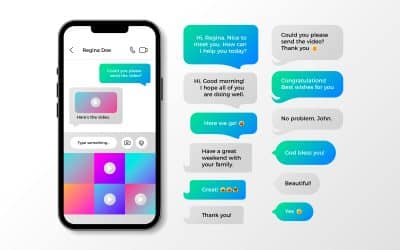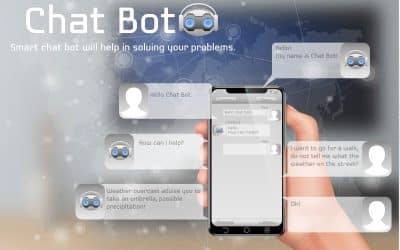AI in healthcare in recent years, is leading to an exciting new era that will transform how patients receive care and diagnosis. The exciting blend of cutting-edge technology and medical advancements can revolutionize healthcare accessibility, boosting quality and efficiency!
The impact of AI’s immense power can be seen in its capacity to improve diagnostic accuracy by using advanced algorithms that allow healthcare professionals to make better-informed choices. From customized treatment plans based on machine learning to the automated handling of administrative duties, AI streamlines processes and improves healthcare outcomes. This paradigm shift extends to early detection of disease, prescriptive analytics to improve patient outcomes, and the creation of new technologies for telehealth.
However, these advances come with ethical issues, data security issues, and the necessity for continuous professional training. This introduction provides the foundation for examining the many facets of AI development in healthcare. It will delve into this revolutionary integration’s potential applications, benefits, and crucial aspects.
Improving Diagnostic Accuracy Using AI Algorithms
Healthcare is undergoing significant transformation due to advanced technology like artificial intelligence (AI) algorithms, which are primarily aimed at improving diagnostic accuracy’s capacity to analyze large data sets with astonishing precision, and speed has proved to be a critical factor in the revolutionization of how doctors diagnose. Based on various medical data, machine learning algorithms can help healthcare professionals recognize complex patterns and subtle signs of abnormalities not visible to our eyes. This ability is especially evident in medical imaging, where AI machines excel at interpreting radiological images, pathology slides, and other visual diagnostic methods. The sophisticated analysis offered by AI is not only able to speed up the timeline of diagnostics but can also drastically reduce the error margin, which improves overall accuracy.
AI algorithms constantly learn and adjust to new data inputs, making an ever-changing and dynamic diagnosis framework. Adaptability is vital to staying abreast of new medical research and enhancing the diagnostic criteria. The application of AI in diagnosis extends beyond image interpretation. It covers a vast range of clinical information, such as patient histories along with genetic information, as well as the physiological parameters that are in real-time. Through the amalgamation of various types of data, AI algorithmic processes contribute towards understanding each patient’s profile, allowing for more customized and specific diagnostic strategies.
As the algorithms develop and become more sophisticated, they are poised to transform diagnosis, prognosis, and treatment plans, eventually improving healthcare accuracy and efficiency. Combining human skills and AI algorithms is beginning a new era in diagnostic capabilities. It promises an era where healthcare professionals can leverage the full power of technology to deliver rapid, accurate, and individualized diagnostic treatments.
AI-powered Imaging for Precise Medical Diagnoses
Incorporating Artificial Intelligence (AI) into medical imaging is revolutionary in pursuing accurate and effective diagnostics. AI-powered imaging technologies have shown remarkable capabilities in transforming medical diagnostics, especially pathology and radiology. With sophisticated machine learning algorithms, AI analyses large amounts of visual data with incredible speed and precision, allowing health professionals to discover subtle patterns and anomalies invisible to human eyes. In radiology, for example, AI algorithms excel in reading the fine details in the X-rays, MRIs, and CT scans, offering an accuracy that increases the certainty of diagnosis. Pathologists benefit from AI’s proficiency in examining pathology slides, aiding in quickly and precisely identifying microscopic anomalies.
AI’s real-time data processing and analytics capabilities dramatically speed up the diagnostic process, providing quick insights to ensure timely medical interventions. Additionally, AI augments medical imaging by helping to develop three-dimensional reconstructions and predictive modeling that give a more complete understanding of anatomical structures and possible diseases. As AI systems continually learn and adapt to changing data sources, they become more proficient in identifying subtle variations and uncommon ailments, resulting in an extensive diagnosis toolkit for healthcare professionals.
Beyond diagnosis, AI-powered imaging is also key in treatment planning, monitoring therapeutic responses, and predicting patient outcomes. The transformative synergy between AI and medical imaging signals an era of change in healthcare in which precision, efficiency, and individualized diagnostics combine to revolutionize the standards of care and raise patient outcomes to a new level.
Individualized Treatment Plans Using Machine Learning
The introduction of machine learning in healthcare has evolved how healthcare is conducted, especially when creating customized treatment plans tailored to each patient profile. Thanks to their ability to analyze large and varied data sets, the algorithms that learn from machine learning allow healthcare professionals to improve treatments. Using patient-specific information, including medical background, lifestyle factors, and treatment response, machine learning algorithms can discern patterns and connections that help create highly customized treatment strategies. This degree of personalization surpasses the standard one-size-fits-all method, allowing for treatments designed to meet each patient’s specific characteristics and requirements.
Through continual learning and adaption, machines learn to improve their comprehension of complex interactions between factors that affect the outcome of treatments. This process increases the effectiveness of current treatments and holds the potential to reveal new therapies. Machine learning is a key element of predictive models, predicting possible responses to various treatments and determining the most effective treatment method for particular patient groups. In addition, these algorithms aid in identifying potential adverse effects and allow proactive steps to minimize the risk and improve patient safety.
Machine learning in customized treatment plans creates a patient-centered healthcare approach, emphasizing precision, efficiency, and results. While technology continues to advance the synergy of personalized medicine and machine learning, it is set to transform the world of healthcare and open up a new realm where treatment methods are as distinct as the people they aim to treat.
Automation of Administrative Tasks in Healthcare
The automated management of administrative tasks in the healthcare industry is becoming a transformative force in streamlining processes and increasing overall efficiency in a field characterized by complex workflows and a plethora of documentation. Artificial Intelligence (AI) and automation technology manage various administrative tasks, from billing and scheduling appointments to managing medical records. Using sophisticated algorithmic techniques and automated processes, routine and time-consuming tasks are completed efficiently, minimizing mistakes and reducing administrative burden for healthcare professionals. Automation not only speeds up processes but also helps achieve cost reductions by maximizing the use of resources and eliminating the inefficiencies in manual processes.
Appointment scheduling, for example, is a benefit of automated systems that take into account aspects like the preferences of patients as well as the availability of physicians and capacity of the facility, which ensures efficient utilization of resources and cuts down waiting time. Processes for billing are simplified with automated code coding and claim processing to reduce billing errors and increase reimbursement times. Furthermore, digitizing medical records and automated data entry increases quality, accessibility, and security. This results in a more flexible and responsive healthcare system that can handle more information while ensuring conformity with the regulations.
Beyond the tangible benefits for operational efficiency, automation of administrative tasks enables healthcare professionals to shift their focus to care for patients and clinical making. In reducing administrative burdens, automation helps create a focused and patient-oriented healthcare environment, leading to better coordination of care, communication, and better outcomes in healthcare. As healthcare continues to adopt automation, the possibility of greater efficiency and better patient experience becomes a key aspect of the ever-changing healthcare system.
The Role of AI in Early Disease Detection
Artificial intelligence (AI) is integral in revolutionizing the early detection of diseases, providing unimaginable capabilities to analyze huge data sets and detect subtle patterns indicative of different diseases. One of the significant advantages of AI in healthcare is its capability to discern vast and complex data sources, which range from genetic and medical imaging details to digital health records and wearable data. When it comes to the field of medical imaging, AI software is adept at finding nuanced anomalies during radiological scans. This helps identify diseases earlier, like cancer, neurological diseases, and cardiovascular diseases. Machine learning models can analyze genetic data to determine predispositions to hereditary disorders and evaluate an individual’s vulnerability to various health risk factors.
Early detection of diseases by AI isn’t restricted to a specific medical field. It can be extended to predictive analytics that uses the historical health information of a patient to identify and anticipate the potential risk. Monitoring the physiological state continuously with wearable devices armed with AI algorithms allows immediate health assessments that prompt treatment and prevention. The use of AI in diagnostic and screening processes improves the speed and accuracy of diagnosis and aids in creating targeted and customized health interventions.
As AI systems continually adapt and learn from new data inputs, their ability to detect disease early increases, becoming a valuable tool in pursuing proactive and preventive health. AI’s revolutionary effect in this area promises to shift the healthcare paradigm from reactive treatment to proactive, preventative strategies, ultimately improving patient outcomes and decreasing the strain on the healthcare system.
Enhancing Patient Outcomes by Predictive Analytics
Predictive analytics, aided by Artificial Intelligence (AI), is key for healthcare professionals to improve patient outcomes. Through vast data sets and advanced techniques, predictive analysis provides a proactive approach to healthcare for patients. It allows healthcare professionals to spot potential health problems and intervene before they become serious. One of the main benefits is risk stratification, where models use predictive models to analyze patient data to determine the patients most at risk of complications and readmissions or adverse events. This enables targeted interventions, individualized care plans, and optimizing resources, ultimately improving patient care quality. Furthermore, predictive analytics can aid in managing chronic illnesses by anticipating the progress of diseases and tailoring treatments to minimize the risk.
Predictive analysis improves resource allocation in hospital operations by forecasting patient admission rates. This helps hospitals predict demand, allocate personnel efficiently, and ensure sufficient resources are in place. Predictive analytics not only improves operational efficiency but also contributes to cost reduction and enhanced patient satisfaction. Furthermore, predictive analytics can aid in preventing infection by identifying possible outbreaks and providing proactive measures to limit the spread of illness.
As AI algorithms continue to learn and adjust to new data sources, predictive analytics models are evolving in a way that becomes more refined and precise over time. This dynamic capability makes predictive analytics essential in constantly searching for the highest quality of medicine and patient-centered care. The fusion of medical and predictive analytics reflects an evolution in healthcare paradigms towards an era where medical interventions aren’t just reacting but also proactive, creating an environment of healthcare focused on prevention, individualized treatment, and, ultimately, better patient outcomes.
Telehealth Advancements Through Artificial Intelligence
Telehealth has seen significant advances that were accelerated by integrating technology such as Artificial Intelligence (AI), which has profoundly impacted accessibility to healthcare and delivery. AI is a key factor in improving different aspects of telehealth, including remote consultations and personalized treatment suggestions. The virtual health aids powered with AI help improve patient engagement and streamline communications between healthcare providers and patients, delivering prompt information and assistance. Machine-learning algorithms are utilized to analyze patients’ data during virtual visits. This assists in diagnosis and treatment plans.
Additionally, AI-driven predictive analytics in telehealth help identify health risks that could be a risk to your health by allowing proactive intervention and individualized preventative measures. Integrating AI and telehealth technology helps remotely monitor patients suffering from chronic illnesses via wearable sensors and devices. They continuously gather data, and AI algorithms look for patterns, analyze them, and provide real-time information about patients’ conditions. These advances allow patients to take greater control of their health and ease medical systems by cutting down on unneeded hospitalizations and readmissions.
Incorporating AI in telehealth isn’t free of challenges like data privacy and security concerns. However, ongoing efforts are being made to address these concerns and increase the effectiveness of remote health delivery. While technology continues to develop, the synergistic link between AI and telehealth can expand accessibility to healthcare services, enhance the quality of care for patients, and create an enduring and flexible healthcare system that can fulfill the needs of patients regardless of geographic or demographic borders.
Data Security and Privacy in AI-driven Healthcare
The interplay of Artificial Intelligence (AI) and healthcare opens up many opportunities. However, it also presents complicated challenges regarding confidentiality and security. Since AI systems used in healthcare depend on massive databases, including sensitive patient data, protecting these data has become a top priority. The ethical and legal issues surrounding unauthorized access and data misuse require strict standards to protect healthcare data’s security and integrity. Finding a balance between the advantages of AI-powered chatbot solutions and protecting patients’ privacy is a must, and it requires strong encryption, access controls, and authentication methods. In addition, healthcare institutions must adhere to strict regulation frameworks, such as the Health Insurance Portability and Accountability Act (HIPAA) in the USA, to ensure compliance with privacy regulations.
Furthermore, anonymizing data is vital to limit the possibility of re-identification, particularly regarding sharing data for research or collaboration. As the healthcare industry increasingly embraces AI and machine learning, efforts are focused on establishing standard protocols to protect data, including safe data-sharing practices and creating security-based AI algorithms. Ethics concerns surrounding patient consent and transparency and accountability in AI-driven healthcare highlight the need for robust governance systems.
Collaboration initiatives between tech providers, healthcare institutions, and regulatory agencies are crucial to creating an environment of responsible AI deployment, where technology and patient privacy coexist and ensure that the potential advantages of AI in healthcare can be realized without compromising the trust and confidence of the patients who are part of health care.
Reduced Healthcare Costs through AI Integration
Implementation of AI in healthcare industry is becoming increasingly acknowledged as a powerful instrument for reducing costs and increasing the efficiency and quality of services. One of the most effective methods by which AI helps reduce costs is optimizing administrative processes. AI-driven automation can streamline tasks like billing, appointment scheduling, as well as claims processing while reducing errors, cutting down on manual labor, and, in turn, reducing administrative expenses. Additionally, predictive analytics, enabled through AI algorithms, helps efficiently control healthcare resources and helps avoid unnecessary complications, hospitalizations, and costly readmissions. By identifying high-risk patients and implementing specific interventions, healthcare professionals can lessen the financial burden of managing medically complex and unavoidable illnesses.
Furthermore, AI facilitates more accurate diagnosis, reducing the requirement for lengthy and expensive diagnostic tests. The algorithms that use machine learning, especially used in medical imaging, increase the accuracy of diagnostics, which allows early detection of disease and, consequently, reduces the total expense of medical treatment. Remote patient monitoring using AI-powered devices improves patient outcomes and decreases the number of hospital visits, resulting in significant savings in costs. Additionally, AI supports identifying cost-effective treatment methods by analyzing huge amounts of data to identify the most effective treatments for particular circumstances.
Although the initial introduction of AI technologies could require investments, the longer-term savings and efficiency improvements position AI as an asset of strategic importance for healthcare institutions that want to provide top-quality care economically and sustainably; as technology advances and improves, the synergy between AI and efficient healthcare delivery has the potential to transform the economy of healthcare and create an accessible, efficient, effective, and financially stable healthcare system.
AI in Drug Discovery and Development
The use of Artificial Intelligence (AI) in the development and discovery of drugs can be a transformative force altering the previously lengthy and laborious process of bringing new drugs to the market. AI helps in the discovery process by quickly studying massive datasets, making predictions about potential drug candidates, and evaluating their effectiveness and safety. Machine learning algorithms analyze chemical and biological data to identify patterns and relationships, informing researchers about possible interactions between drugs and targets. This data-driven analysis method speeds up the search for promising compounds, reducing the time and cost in the initial stages of drug discovery. Furthermore, AI facilitates the design of more specific and targeted therapies, increasing the chances of a successful development.
In-silico drug screening powered by AI allows the testing virtual of thousands of compounds. It predicts their biological activity and potential negative effects before conducting physical experiments. This helps in the discovery of promising drugs but also reduces the requirement for an extensive laboratory test. Additionally, AI contributes to personalized medicine by analyzing individual genetic differences, predicting the patients’ reactions to specific medications, and adjusting treatments according to the patient’s needs. The incorporation of AI in the development of drugs also solves the problem of repurposing drugs and finding existing drugs that have the potential for use in new therapeutic areas.
While AI has dramatically improved the beginning stages of discovery, it plays a vital role in optimizing clinical trials via patient recruitment monitoring and data analysis. AI’s revolutionary effect on drug discovery and development has the potential to deliver safer and more efficient drugs to the market faster and more cost-effectively, forming the future direction of innovation in pharmaceuticals.
Enhanced Patient Engagement Using AI Applications
AI application development is revolutionizing healthcare by enhancing patient engagement and providing a personalized approach to healthcare. AI-powered devices contribute to the engagement of patients by supplying accessible and understandable health information, which leads to a greater understanding of health conditions and treatment plans. Virtual health assistants powered by AI provide:
- Interactive interfaces.
- Provide instant responses to patient questions people through prescription regimens.
- Offering specific health information.
Furthermore, AI applications contribute to proactive health management by constantly checking patient data, including vital signs and lifestyle-related factors, as well as providing personalized advice to ensure optimal health.
The use of AI in patient engagement is extended to telehealth platforms that facilitate remote consultations and enable patients to be involved in their journey to healthcare. This is not just a way to increase accessibility for those who are disabled or living in remote locations but also facilitates continuous contact between healthcare providers and patients. AI-powered mobile apps can help patients take charge of their health, giving them personalized fitness routines, diet advice, and medication reminders. Furthermore, virtual support communities created by AI platforms allow patients to interact with patients with similar health concerns and promote a sense of belonging and emotional assistance.
The benefits of increased patient engagement through AI are significant, but ethical concerns regarding data security and privacy should be carefully dealt with. As AI develops and becomes more effective in enhancing patient engagement, it can make healthcare a patient-centered, collaborative, and preventive approach, where patients are actively involved in their health management, resulting in better outcomes and an integrated approach to wellness.
Challenges and Ethical Considerations in AI Healthcare
Artificial Intelligence (AI) in healthcare offers many possibilities but creates ethical concerns and issues requiring thoughtful evaluation. A significant issue is the possibility of bias within AI algorithms since they can learn from data, which could reflect current differences in healthcare delivery. Ensuring fair and equal treatment of all patients requires continuous scrutiny and re-evaluation of algorithms to eliminate the effects of biases. Data privacy is another significant aspect, considering AI systems typically depend on sensitive patient information. The delicate balance between the advantages of data-driven insight and protecting patients’ privacy requires robust security measures for data and compliance with strict privacy laws.
Additionally, AI algorithms’ explicability and interpretational capabilities raise ethical questions and ethical dilemmas, particularly in critical decisions. It is also important to note that the “black box” nature of complicated algorithms raises questions regarding transparency and accountability since medical professionals and patients might not fully understand how decisions or suggestions are formulated. Furthermore, issues related to informed consent and patients’ autonomy become significant when patients are not willing or comfortable entrusting their health decisions to machines.
The ethical issues include the possibility of loss of jobs for healthcare professionals because of increased automation, which requires a carefully planned approach to the transition of workforces and education. As AI advances in healthcare, it is essential to create complete ethical guidelines, industry standards, and regulations that focus on privacy, patient safety, and the fair sharing of the benefits. Suppose we address these issues with a keen eye. In that case, healthcare providers can fully harness the power of AI while adhering to the ideals of transparency and fairness and focusing on patient-centric healthcare.
The Impact of Natural Language Processing on Patient Communication
Natural language processing (NLP) is becoming a revolutionary factor in the communication of patients in the healthcare field that improves understanding, efficiency, and accessibility. NLP allows machines to comprehend human speech, enabling smooth interactions between healthcare providers and patients. The most notable results can be seen regarding chatbots or virtual health assistants, which use NLP to have conversational, natural interactions with patients. These AI-driven interfaces play a crucial role in responding to queries, providing health information, and offering advice regarding treatment plans in a way that patients can comprehend. NLP applications can also be used with electronic medical records (EHRs) that allow health professionals to gain helpful information from notes on clinical conditions, increasing the quality of patient records and assisting informed making.
Additionally, NLP contributes to personalized healthcare communications by tailoring information to each patient’s characteristics, such as preferences, health, and literacy levels. This personalization enhances patient comprehension and creates an empowering feeling and participation in their health journey. Automated reminders for appointments, medication instructions, and follow-up communications utilize NLP to increase the clarity and consistency of your messages, thus helping improve health outcomes.
Although NLP has shown tremendous potential in improving patient communication, ethical issues related to information privacy and the right to be informed should be carefully considered. Since the synergy of NLP and patient communications is evolving, healthcare providers stand to gain from more effective methods of communication that are patient-centric and help bridge the gap between technical complications and the human experience, ultimately leading to better patient satisfaction and better outcomes.
AI-driven Robotics in Surgical Procedures
Integrating artificial intelligence (AI) and robotics into surgical procedures signals an era of efficiency, precision, and advancement in the healthcare industry. AI-driven robotics give surgeons advanced capabilities, which allow the most precise and minimally invasive procedures. Machine learning algorithms analyse massive databases to offer real-time information during surgery, helping surgeons make decisions and improve surgical workflows. These robotic systems can provide more precision for delicate procedures, reducing the chance of human error and enhancing the overall outcomes of surgeries. In addition, AI algorithms can analyse the patient’s specific data, including medical images or diagnostic data, and adapt surgical plans to individual anatomy, leading to an individualized treatment method.
Robotics are especially advantageous when performing complicated and complex procedures, as they allow surgeons to manoeuvre difficult anatomical structures easily. Robot-assisted surgery can also reduce the trauma to tissues around it, which results in faster healing times and fewer risks for post-operative patients. Teleoperated robotics, guided by AI, can further expand the scope of surgical expertise through remote surgical procedures that connect specialists to patients living in remote or underserved regions.
However, the use of robotics driven by AI has been challenging, with concerns regarding the reliability of the technology, ethical considerations, and the necessity for a comprehensive education for medical professionals. As technology advances, the synergy of AI and robotics can push the limits of what is possible in surgery and pave the path to a future where accuracy, accessibility, and individualized interventions are the norm of medical care.
Remote Monitoring and AI-enabled Wearable Devices
Integrating Artificial Intelligence (AI) with wearable devices has revolutionized health care through remote monitoring, providing constant and personalized information about people’s health indicators. Wearable devices with AI capabilities, fitted with sensors and sophisticated algorithms, allow for real-time monitoring of physiological indicators like heart rate blood pressure, glucose levels, as well as activity patterns. The continuous data stream allows for early detection of any anomalies, allowing prompt intervention and individualized health management. Machine learning algorithms analyze the data collected, providing a predictive analysis that can predict future health issues and help patients and healthcare professionals make educated decisions regarding the best preventive measures and treatment options.
Remote monitoring via wearables with AI is a significant development for managing chronic diseases. Patients suffering from conditions such as diabetes, cardiovascular disease, and respiratory diseases can benefit from continuous monitoring, allowing the ability to make proactive changes to treatments based on current health information. Furthermore, wearable devices boost patient engagement by fostering confidence and awareness of their health, encouraging lifestyle changes, and adhering to treatment plans.
Although incorporating AI into wearable gadgets holds enormous potential, it also creates challenges in privacy, security, and the need to integrate with the existing healthcare systems. The solution to these concerns is vital to fully reaping the advantages of remote surveillance. While technology will continue to advance in the near future, the synergy of AI and wearable technology can potentially transform the way healthcare is delivered, moving from reactive to proactive, focusing on prevention measures and individualized treatment in a scalable and patient-centric way.
AI-driven Virtual Health Assistants
AI-driven virtual health assistants are an entirely new approach to healthcare. They provide a customized and easy-to-use interface for both patients as well as healthcare professionals. Utilizing advanced Natural Language Processing (NLP) and machine learning algorithms, these virtual assistants engage in conversational, interactive interactions with users, address inquiries, provide health information, and assist with various health-related tasks. Utilizing vast databases and constantly learning from user interactions, AI-powered assistants can provide personalized guidance, reminders for medication, and emotional support, increasing patient engagement and adherence to treatments. Integration of health virtual assistants in the telehealth platform allows remote consultations, enhances access to healthcare, and closes gaps in the delivery of healthcare, particularly in the most underserved or remote areas.
Virtual health assistants can improve administrative efficiency by making appointment schedules easier, coordinating prescription refills, and aiding with insurance-related queries. There is a need to hire AI chatbot developers that go beyond patient interactions, helping healthcare professionals with administrative tasks and providing decision-making support. Potential applications include:
- The streamlining of EHR (EHR) documents.
- Making it easier for data retrieval.
- Assisting in making clinical decisions by providing pertinent data in real time.
However, as AI-driven virtual health assistants are becoming integral to the healthcare system, ethical concerns around privacy, security, and biases that could be incorporated into algorithms must be considered. Achieving a balance between the effectiveness and convenience they offer and protecting patient data is essential to build confidence in their deployment. Since virtual health assistants will continue to advance their role in healthcare, they are set to alter the patient experience, the administrative workflows, and the general delivery of healthcare services and services, bringing about a new moment in the integration of AI as well as healthcare.
Improved Accessibility to healthcare with AI
Artificial Intelligence (AI) significantly transforms healthcare accessibility by removing barriers and making a more inclusive and patient-centric approach. Telehealth platforms that AI powers are emerging as an innovative way to provide remotely-based consultations, diagnostics, and monitoring, which is alleviating geographical barriers and providing health services to those living in areas that are not well-served or isolated. AI-driven chatbots and virtual health assistants increase accessibility by offering immediate and customized responses to health-related inquiries that allow individuals to get assistance and information without having to make appointments in person. Machine learning algorithms are a part of predictive analytics, identifying at-risk populations and providing proactive intervention, especially in preventive health and public health programs.
Additionally, AI facilitates the creation of user-friendly interfaces and apps that make information about healthcare and resources accessible to those with varying levels of health knowledge. Wearable devices with AI algorithms can constantly monitor various health indicators, providing real-time insight and early warning of potential health problems. Furthermore, AI supports language translation and interpreter services, ensuring an efficient information exchange between healthcare professionals and patients from various languages.
Despite these developments, challenges like the digital divide, privacy issues, and the need for a regulatory framework must be addressed to ensure equal access. As AI technology persists in developing and improving, its impact on accessibility to healthcare goes beyond the traditional boundaries, resulting in an increasingly patient-centered, responsive, and global healthcare landscape. The transformational impact of AI on accessibility to healthcare has the potential to bridge the existing gap, eliminate the gap between patients and doctors, and create an improved and more adaptable healthcare ecosystem.
The Evolution of Electronic Health Records with AI
Introducing artificial intelligence (AI) into electronic health records (EHRs) is a paradigm change in how healthcare data is gathered and used for analysis. AI can bring new capacities to EHR systems, improving the efficiency, accuracy, and capacity to gain valuable insights from massive data sets. Machine learning algorithms inside EHRs provide intelligent data processing that facilitates the detection of trends, patterns, and patterns in patient data. These algorithms aid in predictive analytics, predicting the possibility of health problems and helping create customized treatment plans based on individual patient profiles. AI-driven EHRs can streamline administrative tasks by automating data entry, coding, and billing processes, decreasing mistakes while also increasing overall efficiency.
In addition, natural language processing (NLP) technologies integrated into AI-enhanced EHRs allow for extracting meaningful information from clinical narratives that aren’t structured by making sense of notes in free text and increasing the quality of the patient’s records. Decision support systems based on AI aid health professionals by providing real-time pertinent and reliable information, helping in clinical decision-making, and improving patient care outcomes. The development of EHRs incorporating AI goes beyond the individual patient’s care. It assists in implementing population health management strategies by analyzing collected data to determine risks, trends, and areas that require interventions.
Although incorporating AI in EHRs can bring substantial benefits, challenges like privacy, data security, and the need for standardization of interoperability protocols need to be addressed. The continuous development of EHRs using AI is a step in the right direction toward a more data-driven, efficient, and intelligent healthcare system where technology meets the needs of health professionals and patients.
Machine Learning for Predicting Patient Admissions
Machine Learning (ML) is emerging as an effective method of the prediction of admissions to patients, transforming healthcare through targeted and proactive interventions. By analyzing historical patient information, ML algorithms can identify patterns, risk factors, and predictors associated with hospital admissions. These algorithms surpass conventional risk scoring systems by incorporating many variables, such as patient demographics, medical history, and social factors influencing health. The predictive capability of ML lets healthcare professionals classify patients according to their probability of being admitted and enables targeted interventions for those at risk. The early identification of patients at risk of being hospitalized facilitates preventative measures, including healthcare management programs, education for patients, and prompt adjustments of treatment regimens, thus reducing the overall cost to the healthcare system.
ML algorithms continuously learn and adapt on the basis of new data sources, improving their prediction accuracy. This ability to adapt is crucial in the constantly changing world of healthcare, in which factors that affect patient admissions may change. Additionally, ML contributes to optimizing the allocation of resources within healthcare facilities, improving bed management, and reducing unnecessary hospitalizations. These forecasts not only assist in improving patient outcomes by ensuring that hospital admissions are avoided but also aid in the efficient use of health resources.
Despite the exciting advances, there are still challenges, such as concerns over the ability to interpret complicated ML models and ethical concerns concerning data privacy. However, incorporating ML to predict patient admissions could change how healthcare is delivered from reactive to proactive, focusing on the importance of preventive care, personalized interventions, and optimizing resources in a data-based paradigm.
AI-driven Rehabilitation and Physical Therapy
Artificial Intelligence (AI) is revolutionizing physical and rehabilitation by offering new solutions to provide personalized care, enhance treatment plans, and improve patient outcomes. AI-driven rehabilitation techniques employ sophisticated algorithms to study biomechanical data, movements of patients, and physiological responses. This data-driven rehabilitation method allows customized rehabilitation programs that meet each patient’s specific needs, leading to the most efficient and effective rehabilitation process. VR (VR) and Augmented Reality (AR) applications powered by AI provide immersive and interactive environments for rehabilitation exercises and provide feedback in real-time on progress, monitoring progress and enhancing the level of involvement.
Machine learning algorithms support adaptive rehabilitation programs by constantly reviewing the patient’s responses and changing the therapy plan. Wearable devices that have AI capabilities allow patients to be remotely observed. This enables healthcare professionals to monitor their progress, identify possible issues, and provide prompt feedback that extends rehabilitation beyond the traditional settings of a clinic. In addition, AI supports the development of robotic-assisted rehabilitation equipment, like exoskeletons or robotic prosthetics, that assist patients to regain mobility and function.
Incorporating AI to improve physical and rehabilitation therapy enhances the quality of treatment and tackles challenges like therapist shortages and geographic obstacles. Although it is promising, ethical concerns about patients’ privacy, moral problems, and the necessity for standardized protocols have to be considered to ensure the ethical use of AI technology in rehabilitation. As AI continues to develop its use in rehabilitation, it is set to revolutionize the possibilities for recovery. It will provide better, more accessible, and practical solutions for patients participating in physical therapy.
Precision Medicine: Tailoring Treatment Using AI Insights
Precision medicine, driven by the use of Artificial Intelligence (AI), is in the front of a new age in healthcare, which is redefining the treatment methods by tailoring them to the individual characteristics of patients. To discover complex patterns and relationships, AI algorithms analyze medical records, genetic information, lifestyle factors, and treatment outcomes. This method of data-driven analysis allows healthcare professionals to determine precise biomarkers, determine patients’ responses to specific treatments, and develop effective therapies while minimizing adverse effects. Machine learning models are constantly evolving by absorbing actual patient data to refine their predictions and adapt to changing medical research, thus expanding the area of precision medicine.
Additionally, AI facilitates the identification of unusual genetic anomalies and mutations that may affect susceptibility to disease or progression and the reaction to treatment. The granularity of patients’ profiles enables health professionals to make the right decisions regarding the most effective treatment options. It allows the shift from a universal approach to a more customized and efficient strategy. This synergy of AI and precision medical treatment goes over-diagnosis and treatment plans. Continuous monitoring and adjustment according to the patient’s responses ensure a fluid and adaptable healthcare approach.
Although the advantages of precision medicine using AI are enormous, issues such as ethical concerns, data privacy concerns, and the necessity for interprofessional collaboration have to be dealt with. As technology advances, incorporating AI knowledge in precision medicine can revolutionize healthcare, delivering more efficient personalized, individualized, and patient-centric interventions that significantly improve enhanced medical outcomes.
Collaboration among Human Healthcare Providers and AI Systems
The partnership between human healthcare practitioners and Artificial Intelligence (AI) systems is a significant paradigm shift, bringing an age where each of these organizations works together to improve patient care and outcomes in healthcare. AI improves health professionals’ capabilities by processing massive amounts of data, incredibly fasting insights, and assisting in medical decision-making. The machine-learning algorithms analyse various data sets, assisting in the early detection of disease and personalized treatment planning in addition to predictive analytics. The efficacy that AI can provide AI can be extended to other administrative duties that streamline processes like appointment scheduling, billing, and management of medical records.
Human-AI collaboration is particularly prevalent in diagnostic imaging, in which AI algorithms improve the accuracy and efficacy of diagnosis, allowing radiologists to concentrate on complex cases and make nuanced diagnoses. Additionally, AI-driven predictive models detect high-risk patient populations, enabling proactive intervention and preventive health strategies. Despite these advances, collaboration between human beings and AI systems does not come without challenges, such as privacy and ethical concerns, data security issues, and the necessity for continuous professional education.
Effective collaboration requires an interdisciplinary method in which healthcare professionals collaborate with data scientists, ethicists, engineers, and others to ensure AI technologies’ ethical and responsible use. Human interaction is unrivalled in areas such as compassion, patient communication, and the complex decision-making process that requires ethical issues. Successful integration of AI in healthcare requires an equilibrium where technology is complemented by human knowledge, creating an ecosystem for healthcare that is more precise, efficient, and geared towards delivering optimal patient outcomes.
Educational Initiatives for Healthcare Professionals in AI
Healthcare professionals are required to be educated. Related to Artificial Intelligence (AI) has become essential since AI plays a pivotal role in healthcare. Understanding the ever-changing demands of healthcare professionals and their families, education programs are being developed to provide healthcare professionals with the information and abilities needed to tap the power of AI in the clinical setting and decision-making. These initiatives offer various learning opportunities ranging from seminars and workshops to formal courses integrated into nursing and medical curricula. The curriculum typically covers basic concepts in AI machines, machine learning, and data science with practical applications for health care settings. The emphasis is on a better understanding AI algorithm, interpreting the results, and critically evaluating the impact on patient health care.
Additionally, ongoing training programs for professionals and platforms online allow healthcare professionals to learn AI capabilities at their own speed. Simulation environments and hands-on training enable practitioners to gain practical knowledge about applying AI tools for diagnosing, managing, and treating patients. In addition, ethical considerations and patient privacy are essential to these education initiatives that encourage ethical AI implementation in healthcare.
Professional bodies, institutions, and healthcare institutions are working together to create standards to support AI education, ensuring consistency in the content of education and encouraging the incorporation of AI information into various medical specialties. As AI evolves in the future, these educational initiatives are key to making healthcare professionals ready to work in a world where technological advances integrate seamlessly into the patient’s treatment, leading to more educated, adaptable, and competent healthcare professionals.
The Key Takeaway
In the end, the introduction of Artificial Intelligence (AI) in healthcare represents a radical shift that offers remarkable opportunities to improve patient care quality, workflows, and spur innovations. AI applications, ranging from predictive analysis to virtual health aids, are changing how healthcare is delivered with personalized, practical, cost-effective, and easily accessible solutions.
The partnership between healthcare professionals and AI systems highlights their mutual strengths, resulting in an alliance that increases the accuracy of diagnosis, treatment effectiveness, and overall health outcomes. Healthcare professionals are offered educational programs emphasizing the importance of equipping workers with the information and abilities required to maneuver the increasingly complex AI-driven health system responsibly.
However, as privacy concerns and ethical issues need to be addressed, the direction is clear: AI is changing how healthcare is delivered by creating a dynamic, patient-centered, technologically advanced environment that promises improved health for patients and the world. The continual process that the AI chatbot development company shows a dedication to collaboration, innovation, and a constant effort to improve patient-centered healthcare.











